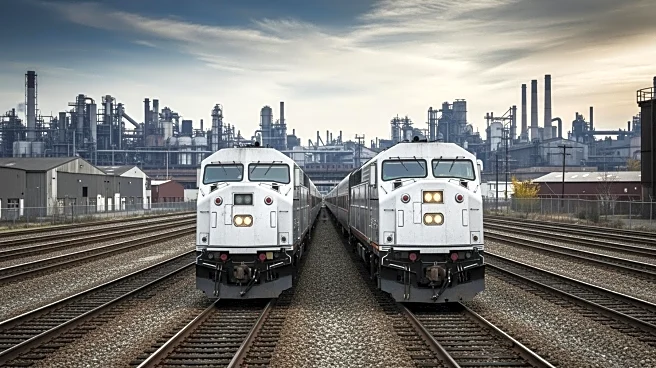What's Happening?
The American Chemistry Council (ACC), representing 40 chemical manufacturing CEOs, has expressed concerns to President Trump regarding the proposed merger between Union Pacific and Norfolk Southern, two
major Class I freight railroad carriers. The ACC's letter highlights fears that the merger could further reduce competition in the U.S. freight rail system, which is already dominated by four railroads controlling over 90% of traffic. The CEOs argue that past mergers have led to service disruptions, increased rates, and weakened supply chains, potentially making U.S. chemical manufacturing less competitive globally. They urge a thorough review by the Surface Transportation Board (STB) to ensure the merger aligns with public interest and enhances rail competition.
Why It's Important?
The proposed merger could significantly impact U.S. manufacturing, particularly the chemical industry, by limiting transportation options and increasing costs. With fewer railroads, manufacturers may face higher rates and less reliable service, affecting their global competitiveness. The ACC's stance underscores the broader implications for the U.S. industrial base, as reduced competition could lead to a duopoly in the rail industry. This situation could also affect farmers and energy producers, who rely on competitive rail services. The outcome of the STB's review will be crucial in determining the future landscape of U.S. freight rail and its impact on various economic sectors.
What's Next?
The Surface Transportation Board will play a pivotal role in reviewing the merger proposal to ensure it meets public interest standards. The ACC calls for the STB to reject the merger unless it clearly improves service and competition. Meanwhile, the merger has gained support from the largest rail union, SMART-TD, which has secured job protection guarantees for its members. The union's backing suggests potential momentum for the merger, despite opposition from the chemical industry. The STB's decision will be closely watched by stakeholders across the manufacturing and transportation sectors.
Beyond the Headlines
The merger raises questions about the balance between corporate consolidation and competition in critical infrastructure sectors. The potential creation of a rail duopoly could set a precedent for future mergers, influencing regulatory approaches and competitive dynamics in the industry. The situation also highlights the tension between labor interests, which may benefit from job security agreements, and broader industry concerns about market concentration and service quality. The outcome could shape the regulatory landscape for mergers and acquisitions in the transportation sector.










